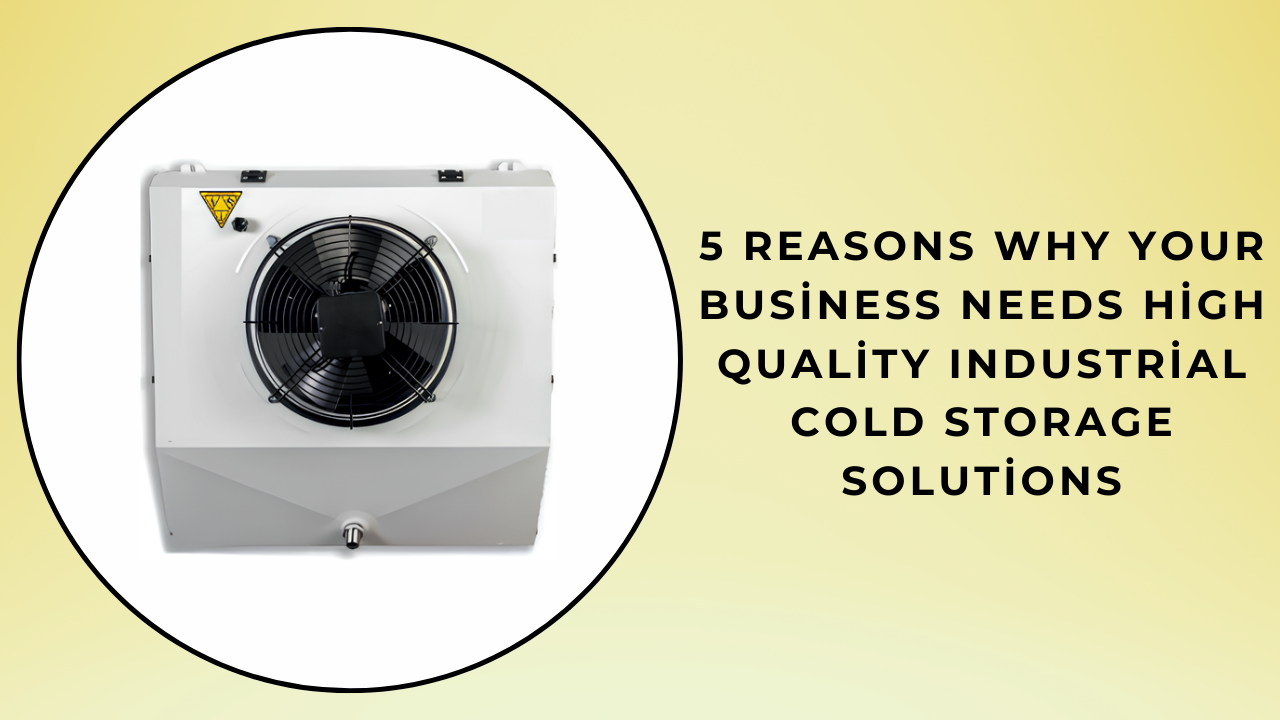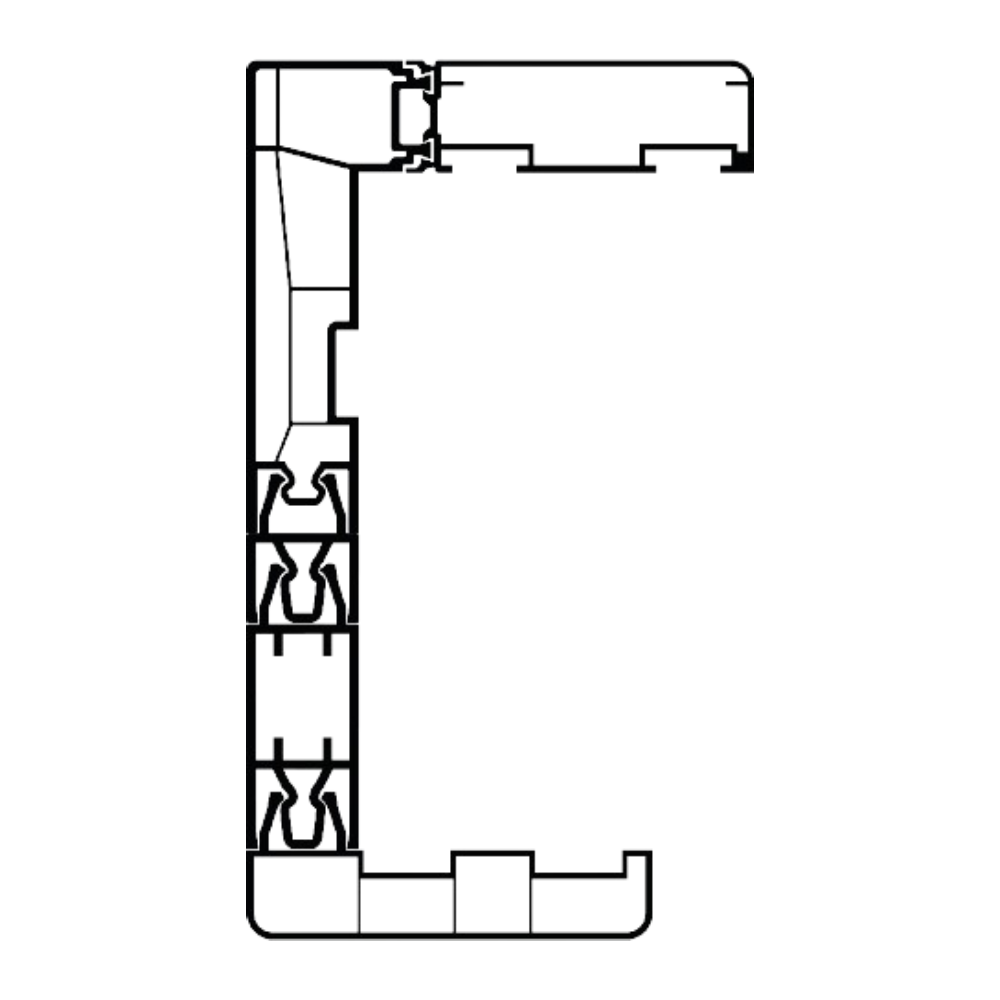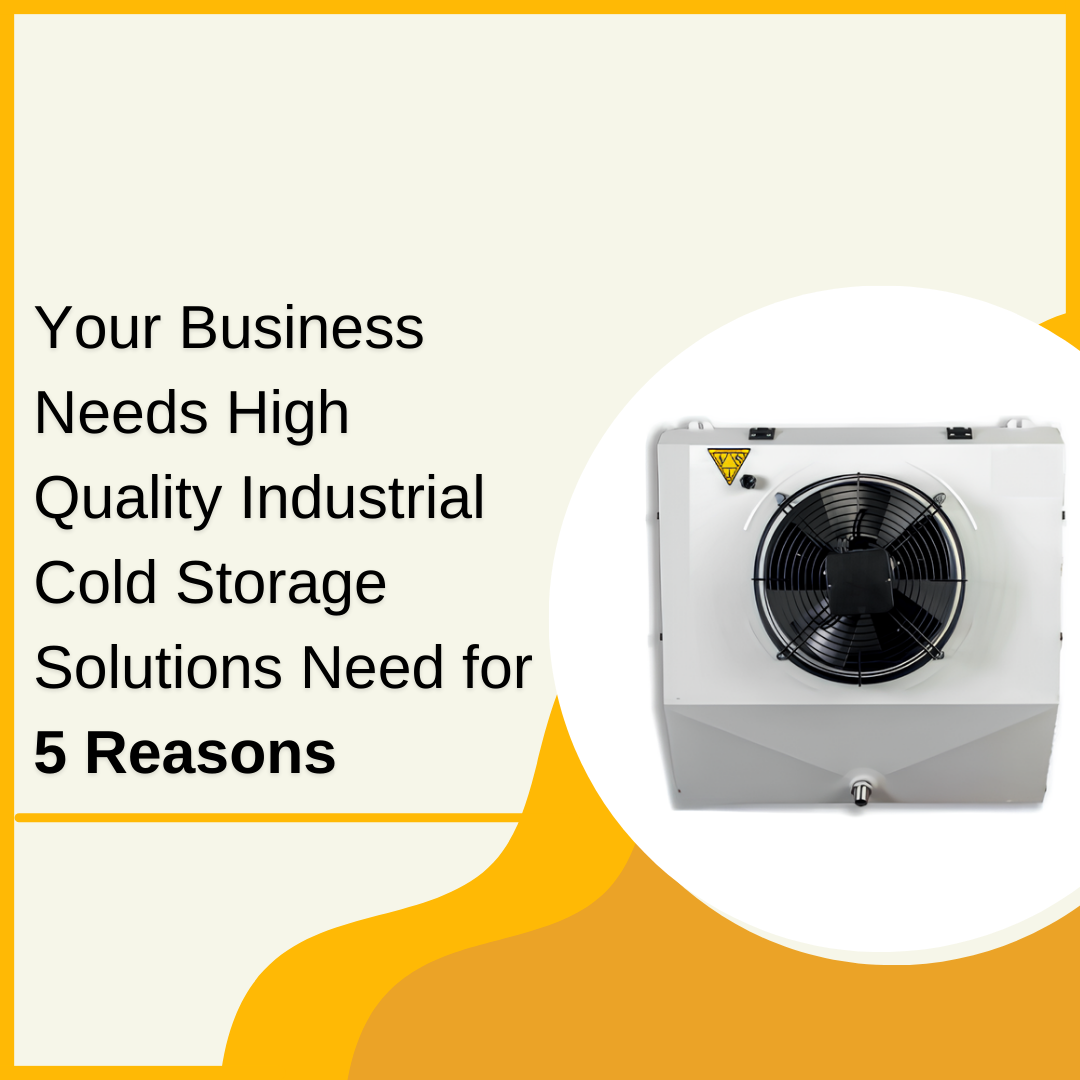5 raisons pour lesquelles votre entreprise a besoin de solutions d'entreposage frigorifique industriel de haute qualité
What is the importance of industrial cold storages for businesses?
Industrial cold storage is critical to enabling businesses to safely store fresh food and other perishable products. These warehouses enable products to be preserved at the ideal temperature for a long time, increasing food safety and preserving product quality. In the food industry, temperature fluctuations during the storage of fruits and vegetables, meat and dairy products, seafood and other perishable foods can adversely affect the quality of the products. Industrial cold storages extend the shelf life of such products and reduce waste.
Cold storages provide businesses with more flexibility. It helps businesses meet demand by providing the opportunity to store excess products, especially during high seasons. This allows businesses to keep costs under control and avoid unnecessary expenses.
High-quality cold storages also play an important role in terms of energy efficiency. Modern cooling systems are equipped with energy-saving technology and offer cost advantages to businesses. Energy efficient systems reduce operating costs in the long term and contribute to environmental sustainability. Therefore, industrial cold storages both increase food safety and provide economic benefits to businesses.
What are the costs of industrial cold storages?
The costs of industrial cold storages vary depending on many factors. First, the capacity and design of the system are important factors that affect costs. Larger capacity systems generally have higher costs, while smaller systems may be more affordable. The quality of the materials used is another factor that affects costs. High-quality insulation materials and cooling equipment may increase initial costs, but can accelerate cost payback by saving energy in the long run.
In the second stage, installation costs come into play. Installation by a professional team is critical for the efficient operation of the system. During the installation process, mounting the system correctly and performing the necessary tests helps prevent future malfunctions. Post-installation maintenance and repair costs should also be taken into consideration. Regular maintenance prolongs the life of the system and prevents unexpected malfunctions.
Operating costs must also be taken into account in terms of energy consumption. Although energy efficient systems may have high initial costs, they can significantly reduce operating expenses in the long run. It should be noted that costs may vary depending on the sector in which the cold storage will be used. In general, although industrial cold storages have high initial costs, they provide benefits to businesses in the long term with the advantages and savings potential they provide.
How to increase the energy efficiency of industrial cold storages?
Increasing the energy efficiency of industrial cold storages is of critical importance to reduce the costs of businesses and reduce their environmental impacts. First, it is important to choose energy efficient equipment. Using high-efficiency compressors, evaporators and cooling systems increases system performance while reducing energy consumption. Automatic control systems optimize energy consumption by constantly monitoring temperature and humidity levels.
Secondly, regular maintenance and cleaning are necessary to improve energy efficiency. Cleaning the filters improves airflow and reduces energy consumption. Checking refrigerant levels regularly and replenishing when necessary increases the efficiency of the system. Using high-quality insulation materials also saves energy. Good insulation helps the cooling system consume less energy by preventing outside heat from entering.
Attention should be paid to the sealing of the doors. Regular checking of door seals prevents temperature losses. It is also important to make updates to the design of the system when necessary. Systems equipped with smart technologies increase energy efficiency and reduce costs. All these measures reduce operating costs by increasing the energy efficiency of industrial cold storages.

In which sectors are industrial cold storages used?
Industrial cold storages are widely used in many sectors. The food industry is the area where these warehouses are used most intensively. These solutions are of critical importance, especially in the storage of perishable products such as meat and dairy products, seafood, frozen foods and fruits and vegetables. In order to ensure food safety, manufacturers and distributors prefer these systems.
Secondly, the healthcare industry also benefits from industrial cold storage. Low temperatures are required for storage of medications, vaccines and blood products. Healthcare facilities use cold storage to maintain the quality and effectiveness of these products. Laboratories and research centers also benefit from industrial cold storage. Proper temperature control is necessary for the storage of chemicals, biological samples, and other sensitive products.
The logistics industry also uses cold storages. Cold chain transportation is vital to keeping food products fresh. In this way, safe and fresh foods can be delivered to consumers. Industrial cold storages play an indispensable role in many sectors such as food, healthcare and logistics.
What should be considered in the maintenance of industrial cold storages?
Maintenance of industrial cold storages is of critical importance for the efficient operation of the system and product safety. First, temperature control systems need to be checked regularly. Temperature fluctuations can adversely affect the quality of products. Therefore, calibration of temperature sensors and regular checks must be carried out.
Secondly, it is important to clean the filters and evaporators. Dirty filters can increase energy consumption by obstructing air flow. Cleaning processes increase the efficiency of the system and prevent malfunctions. Checking refrigerant levels is also a critical step. Low fluid levels can reduce cooling performance. Therefore, it should be checked at regular intervals and renewed when necessary.
Thirdly, the external appearance and insulation of the system need to be checked. Whether the insulation is in good condition is an important factor affecting energy efficiency. Regular checking of door seals prevents temperature losses. Working with a professional team for maintenance and repair operations increases the security and efficiency of the system. These measures extend the life of industrial cold storages and ensure the safety of products.
What are the environmental impacts of industrial cold storages?
Industrial cold storages should be designed to minimize environmental impacts. First, energy efficiency is an important factor. Modern cooling systems have been developed to reduce energy consumption. Energy efficient systems help businesses reduce their environmental footprint. Energy saving both reduces operating costs and minimizes greenhouse gas emissions by reducing fossil fuel consumption.
Secondly, the environmental impact of the refrigerants used must also be taken into account. Conventional refrigerants may contain substances that can deplete the ozone layer and contribute to global warming. Therefore, the use of natural and environmentally friendly refrigerants is gaining importance. In recent years, natural refrigerants such as CO2 and ammonia have emerged as environmentally friendly alternatives.
Third, the sustainability of the materials used in the construction of cold storages can also reduce environmental impact. Using energy efficient insulation materials reduces energy consumption. The environmental impacts of industrial cold storages can be controlled through energy efficiency, selection of refrigerants and construction materials. These measures are necessary to both protect the environment and provide cost advantages to businesses in the long term.
What safety precautions should be taken for cold storage systems?
Cold storage systems require various measures for the safety of both employees and products. First, fire safety measures are important. Since electrical equipment is used in cold storages, the risk of fire must be minimized. Precautions such as fire extinguishing systems and emergency exits should be taken. It is important that employees are trained in fire safety.
Secondly, the electrical components of the system need to be checked regularly. The condition of electrical panels and cables must be carefully monitored to avoid possible risks of short circuit and fire. The safety of refrigerants is also important. In case of leakage, measures must be taken to prevent environmental impacts. Necessary protective equipment must be provided for employees to work safely.
Third, regular maintenance and inspection of the cold storage is critical for safety. Early detection of malfunctions and leaks can prevent possible accidents. Employees must be ensured to act in accordance with the rules and procedures of the cold storage. Taking security measures in cold storage systems is a critical requirement for both the business and the employees.
What are the latest technologies in industrial cold storage?
The latest technologies used in industrial cold storage are constantly evolving in order to increase efficiency and reduce costs. Firstly, IoT (Internet of Things) technologies are widely used in cold storages. These systems offer remote monitoring and control, allowing real-time monitoring of temperature and humidity levels. Users can control their systems and receive warnings about possible malfunctions via mobile applications.
Secondly, intelligent automation systems enable cooling processes to be optimized automatically. These systems protect product quality while reducing energy consumption. Smart sensors constantly monitor temperature and humidity levels and automatically make necessary adjustments. This reduces the need for human intervention.
Third, energy efficient cooling systems have been developed to increase environmental sustainability. New generation compressors and evaporators offer high performance while consuming less energy. The use of natural refrigerants minimizes environmental impacts. The latest technologies used in industrial cold storages provide significant advantages to businesses in terms of efficiency and sustainability.
What are the common problems experienced in industrial cold storages?
Common problems experienced in industrial cold storages can negatively affect the efficiency of the system and product quality. First, temperature fluctuations are one of the most common problems. This may occur as a result of malfunctions or incorrect adjustments in the cooling system. Temperature fluctuations can cause food spoilage and waste.
Secondly, refrigerant leaks are also a common problem. Leaks reduce the efficiency of the system and can cause environmental problems. Regular maintenance and checks ensure early detection of leaks. Third, equipment failures are a common occurrence in cold storage. Compressor malfunctions, evaporator problems or electrical problems may adversely affect the operation of the system.
Hygiene and cleaning problems are an important issue in cold storage. Inadequate cleaning can reduce the quality of products and pose health risks. Therefore, it is necessary to implement regular cleaning and hygiene protocols. These problems experienced in industrial cold storages can be minimized with regular maintenance and checks.
How are the capacities of industrial cold storages determined?
The capacities of industrial cold storages are determined depending on many factors. First, the type and quantity of products to be stored is one of the most important factors affecting capacity. For example, storing different products such as meat and dairy products, frozen foods or vegetables creates different temperature and volume requirements. In addition to the volume of the products, the storage period should also be taken into account. Long-term storage requirements may require a larger capacity.
Secondly, the size of the business and demand fluctuations should also be taken into account when determining capacity. Increased demand during high seasons may require a larger cold storage. Optimizing business processes is important to prevent unnecessary costs.
Thirdly, the design and structure of the cold storage also affects the capacity. A well-organized warehouse with high ceilings allows storing more products. The capacities of industrial cold storages should be determined according to factors such as product type, quantity, operating needs and warehouse design.
How to save energy for industrial cold storages?
Saving energy in industrial cold storages is important to reduce costs and minimize environmental impact. First, energy efficient equipment must be used. High-efficiency compressors, evaporators and energy-saving lighting systems significantly reduce energy consumption. New generation cooling systems offer high performance with less energy.
Secondly, automatic control systems play a critical role in saving energy. These systems constantly monitor temperature and humidity levels and make automatic adjustments when necessary. Thanks to smart sensors, energy consumption is optimized and unnecessary expenses are avoided.
Third, insulation quality is an important factor affecting energy saving. Good insulation prevents outside heat from entering and ensures that the cooling system consumes less energy. Attention should be paid to the sealing of the doors. Regular checking of door seals minimizes temperature losses. To save energy in industrial cold storages, equipment efficiency, automation and insulation quality should be taken into consideration.
What are the operating costs of industrial cold storages?
Operating costs of industrial cold storages vary depending on many factors. First, energy costs are one of the biggest items. Continuous operation of cooling systems leads to high energy consumption. Therefore, the use of energy efficient equipment is important to reduce costs.
Secondly, maintenance and repair costs must also be considered. Regular maintenance of cold storage systems is necessary to prevent possible malfunctions. Therefore, allocating a maintenance budget keeps operating costs under control. Regular replacement of refrigerants is also a cost factor.
Third, personnel expenses are also a factor that affects operating costs. Qualified personnel are required for the management and maintenance of cold storage systems. This may increase labor costs. Operating costs of industrial cold storages vary depending on factors such as energy consumption, maintenance costs and personnel costs. Carefully managing these costs can increase the profitability of the business.








